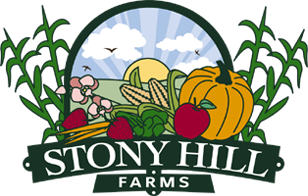Certified Organic NJ Farm
Revolutionizing the way we cultivate
Home > Farm Market > Certified Organic NJ Farm
Farming for the future
In 2019, Stony Hill Farms undertook the necessary steps to become Certified USDA Organic; providing consumer alternatives that satisfy an ever-changing demographic. We took into consideration the growing demand for a more forward-thinking approach to farming and decided to meet those demands. Moving forward, Stony Hill will be providing both conventionally and organically grown produce that is sustainably grown, regardless of the label.
What does certified organic mean?
Anything can be loosely coined “organic;” however, that term only holds merit when the product is certified by the USDA. In order to be USDA Certified Organic, a farm must be approved by the USDA and adhere to the regulations and laws mandated by the governing body. Farms must follow the rules for accepted and prohibited substances and follow these directives set by the National Organic Program that restricts the use of all fertilizers, herbicides, and pesticides. Removing the use of synthetic chemicals supports our overall goal towards sustaining the environment: aiding in the prevention of soil erosion, protecting ground-water sources, improving soil quality, implementing techniques towards ecosystem conservation, and preserving natural habitats for beneficial animals and insects often negatively impacted by the use of chemicals.
If pesticides are not being used, what methods are being used for pest control?
Here at Stony Hill, we have always strived towards farming without the use of chemicals. Whether our produce has been certified organic or not, our main intentions have been towards sustainable methods of cultivation. As we like to say, “pesticides are our last resort.” This means the following:
- IPM: Integrated Pest Management is our main process used to solve pest issues while minimizing risks to people and the environment. We use site assessment, monitoring, and pest prevention in conjunction with a variety of pest management tactics to keep pests within acceptable limits. These methods include physical, horticultural, mechanical, and biological controls instead of immediate use of chemicals. Selective pesticides are utilized only as a last result if all else fails to eradicate the problem. If you’d like to learn more about IPM, check out our growing practices.
- Crop rotation is an extremely beneficial tool towards limiting pesticide threats. By doing so, the same crop will not revisit that field for another 4 years, after it’s done a complete rotation to the other plots of land. This helps to minimize pest immunity towards a certain area of the field as well as improving soil health as an added benefit.
- Preserving as much natural cover and habitat for the insects and animals that will help combat negative pests is essential towards the battle against pests. If we removed all habitat from the surroundings, there would be no beneficial insects and mammals to aid in keeping pest levels minimal. This means preserving the natural tall grasses and flowers bordering the fields and sometimes creating these areas, where birds, bats, and even some insects can habituate and eat harmful pests.
We are certified NJDA Organic
Stony Hill is farming for the future!

